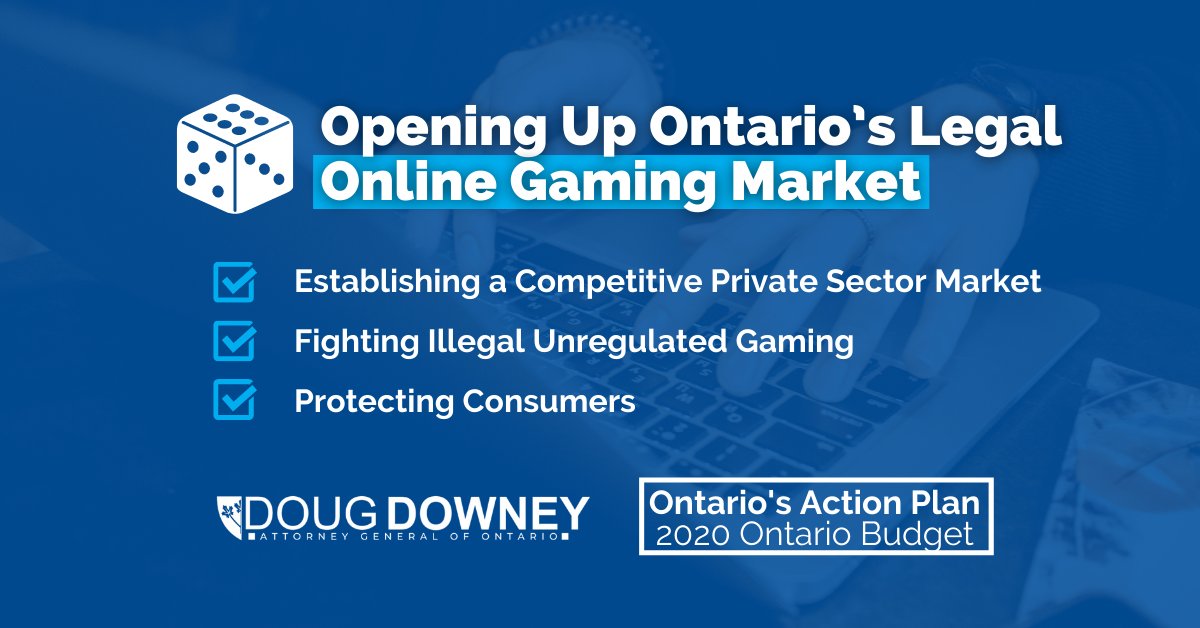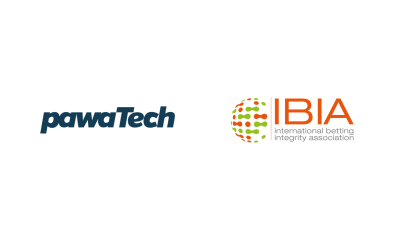AGCO
Ontario Budget Includes iGaming Legislation

The Ontario Provincial Budget was released and specific to the gaming sector, Ontario announced the next steps in moving the regulatory model forward for iGaming.
Included in the budget package is legislation that will transfer Conduct & Manage Authority for iGaming from OLG to the AGCO. Below is the paragraph from the budget:
Establishing a Market for Internet Gaming (iGaming) in Ontario
In the 2019 Budget, the government stated its intention to establish an online market for internet gaming (iGaming) in Ontario that is both competitive and protects consumers. In continuing to work towards this goal, the Province is introducing legislation to give the Alcohol and Gaming Commission of Ontario (AGCO) authority to conduct and manage iGaming, in addition to having the role of the regulator.
If the proposed legislation is passed, a dedicated subsidiary under the AGCO would be established as the conduct and manage entity to manage the relationship between the government and private iGaming operators.
The Province and the AGCO intend to continue consulting with key stakeholders on the design of the iGaming market to reflect consumer preferences and foster an exciting gaming experience, while ensuring that appropriate responsible gaming protections are in place. These engagements will include a number of diverse topics, including approaches for revenue collection, data and gaming system requirements, the licensing and registration approach, product offerings and marketing considerations.
The Province will also continue to engage with the federal government to encourage the legalization of single-event sports wagering. Legal single-event sports wagering would help support the growth of a competitive online gambling market in the province and, as a popular form of wagering, would also benefit other parts of the gaming sector.
CGA News Release on iGaming
Today the CGA issued a news release to applaud the Government of Ontario’s decision to move forward with legislation to make internet gambling (iGaming) a reality in this province and to ensure that the people of Ontario have access to safe and legal gambling options online. You can read the full copy here.
Update on Bill C-218 the “Safe and Regulated Sports Betting Act”
On Tuesday November 4, 2020, Bill C-218, the Safe and Regulated Sports Betting Act, had its first opportunity to be debated in the House of Commons.
Having been first introduced in February 2020, the Bill had not been debated due to the suspension of regular House business during the pandemic, which was then followed by the prorogation of parliament in the late summer.
Bill C-218 was restored to its previous position on the House of Commons Order Paper once the House resumed regular business in October.
On Tuesday, five Members of Parliament (MP) spoke in favour of the Bill. The Bill enjoys wide support from MP’s of all parties: Conservative, Liberal, NDP and the Bloc Québecois.
Kevin Waugh, a Conservative MP from Saskatchewan and the sponsor of Bill C-218, led off the debate. He was followed by:
Brian Masse, an NDP MP from Windsor who sponsored previous Bills on single-event wagering.
Rhéal Fortin, a Bloc Québecois MP, led his party’s support for the Bill.
Bob Bratina, a Liberal MP from Hamilton, was the lone speaker from the government side.
Tony Baldinelli, a Conservative MP from Niagara Falls and Special Advisory to Conservative Leader Erin O’Toole for Tourism Recovery, rounded out the hour of debate by speaking to the need for the Bill to pass to assist the gaming and hospitality industries to recover from the impact of the pandemic.
Link to the speeches: https://www.ourcommons.ca/DocumentViewer/en/43-2/house/sitting-25/hansard
Powered by WPeMatico
AGCO
AGCO Fines Great Canadian Casino Resort Toronto $350,000 for Serious Regulatory Violations Linked to Impromptu After-Party on Gaming Floor

The Alcohol and Gaming Commission of Ontario (AGCO) has issued monetary penalties totaling $350,000 against Great Canadian Casino Resort Toronto for multiple violations of provincial gaming standards. The penalties follow an impromptu after-party that was permitted to take place in the pre-dawn hours directly on the casino’s gaming floor.
On September 27, 2024, an electronic dance music event attended by thousands of people was hosted in the theatre adjacent to the casino at Great Canadian Casino Resort Toronto. The event was marked by widespread intoxication, disorderly behavior, and numerous criminal and medical incidents – both inside and outside the venue – including alleged assaults, drug overdoses, and acts of public indecency. Although paid duty officers were present, additional police and emergency services were required to manage the situation.
In the midst of this high-risk environment, casino management approved an unscheduled request by the performing artist to host an after-party on the active gaming floor. The artist and more than 400 guests were permitted onto the gaming floor where the artist was allowed to perform amidst operational table games and gaming machines – without any prior risk assessment or planning.
As a result, security personnel were unable to effectively control the casino floor, including witness reports that an attendee was seen climbing onto slot machines. Failure to maintain appropriate control compromises the security, safety, and integrity of the casino floor. Following the conclusion of the event, the operator failed to promptly report these incidents to the AGCO as required.
Based on the findings of its review, the AGCO’s Registrar has issued an Order of Monetary Penalty (OMP) totaling $350,000 against Great Canadian Casino Resort Toronto. These penalties address critical failures in their operations, incident reporting, employee training, and the management of disturbances.
A gaming operator served with an OMP has 15 days to appeal the Registrar’s decision to the Licence Appeal Tribunal (LAT), an adjudicative tribunal that is part of Tribunals Ontario and independent of the AGCO.
“Casino operators have a fundamental duty to control their gaming environment. Great Canadian Casino Resort Toronto’s lapses in this incident compromised the safety of patrons and the security and integrity of the gaming floor,” Dr. Karin Schnarr, Chief Executive Officer and Registrar of AGCO, said.
The post AGCO Fines Great Canadian Casino Resort Toronto $350,000 for Serious Regulatory Violations Linked to Impromptu After-Party on Gaming Floor appeared first on Gaming and Gambling Industry in the Americas.
AGCO
AGCO: Casino Days Penalized $54,000 for Deceptive and High-Risk Bonus Offer

The Alcohol and Gaming Commission of Ontario (AGCO) has issued a $54,000 monetary penalty alleging Well Played Media, Unipessoal LDA promoted a deceptive bonus on its Casino Days website. The bonus offer is alleged to have encouraged high-risk behavior and failed to properly disclose key terms.
The AGCO launched an investigation triggered by a player who complained that more than $8500 in winnings had been confiscated by Casino Days. The investigation reviewed a so-called “welcome bonus” that promised new players up to $2000.
However, to qualify for the full bonus amount, players had to:
Deposit $2000 of their own money;
Wager $70,000 (35 times the deposit);
Keep each wager at or under $5; and
Complete all wagering requirements within 7 days.
Investigators also found that certain terms of the bonus offer were difficult to find, buried behind multiple links on the site.
AGCO’s analysis showed that the average player would first lose $3640 trying to earn the $2000 bonus.
According to Ontario’s igaming rules, registered operators must not offer bonus promotions that encourage harmful gambling behavior and fail to disclose key conditions appropriately. Further, operators are not permitted to entice players with bonuses that cannot reasonably be attained without significant gambling losses.
These rules are in place to protect players and support a safe, regulated market—one that stands in contrast to the risks of unregulated gambling sites.
An igaming operator served with an Order of Monetary Penalty by the AGCO Registrar has the right to appeal the Registrar’s decision to the Licence Appeal Tribunal (LAT), an adjudicative tribunal that is part of Tribunals Ontario and independent of the AGCO.
“Player protection is a non-negotiable priority for the AGCO. We expect operators to be truthful and transparent about their promotions, and we also require them to ensure that those promotions do not encourage reckless or harmful patterns of play. An offer that requires a player to sustain substantial losses for a perceived benefit is not a fair offer. This penalty sends a clear signal that we will not hesitate to take action against operators who fail to meet their obligations to protect Ontario players,” Dr. Karin Schnarr, Chief Executive Officer and Registrar of AGCO.
The post AGCO: Casino Days Penalized $54,000 for Deceptive and High-Risk Bonus Offer appeared first on Gaming and Gambling Industry in the Americas.
AGCO
What’s next for online gambling in Canada?

Having provided the perfect case study for the benefits of legalised online gambling in Canada, we caught up with Bede’s Chief Executive Officer, Colin Cole-Johnson, to discuss why other provinces may look to follow Ontario’s example in the future and what challenges operators will need to be ready for when they do.
With the regulated online gambling market in Ontario recently being recognised as one of the largest in the world, operators will feel there’s plenty of untapped potential to be realised not just in the province itself, but in Canada as a whole, over the coming months. And for good reason too.
Since legalising online gambling in 2022, the Alcohol and Gaming Commission of Ontario (AGCO) has established a go-to framework for how regulators introduce rules and standards that protect players and enable operators to flourish – and no better is this illustrated than in the performance of the Ontario Lottery and Gaming Corporation (OLG), which has continued to make a hugely positive contribution in the province over the past few years.
Having already paved the way for successful open market regulation through a number of progressive initiatives, with even more yet to come – such as the proposed centralised self-exclusion model – it certainly wouldn’t be a surprise to see other organisations turn to AGCO as an example of how regulations can be introduced both sustainably and profitably; and this will likely present several opportunities for operators as well.
From Bede’s experience in the country, Canadian regulators are thorough and well organised. Any province looking to follow the success of Ontario will no doubt look to AGCO for inspiration, and this may lead to similar regulatory frameworks in other new territory launches. As the gaming community in Canada is so connected, we’ve already seen cross-operator interest in sharing regulatory knowledge, meaning there’s a wealth of information waiting to be leveraged.
As the most likely province to regulate next, Alberta has already shown a preference for following an open-market model similar to Ontario’s, with the input of various industry stakeholders set to guide the way. The onboarding process for operators seeking to enter this potentially vibrant new market is likely to follow promptly after the new framework is enacted, so existing experience and relationships within the Ontario market should prove advantageous for those looking to hit the ground running.
For Bede, our years working closely with AGCO leave us well positioned to enter additional provinces in the future, and we greatly value the guidance and support we gain from having a direct relationship with the regulator. We aspire to grow even further in Canada by forming more provincial partnerships, and our learnings from Ontario will undoubtedly form a key part of this.
Internally, we have a strong framework for new market entry and regulatory compliance that includes cross-functional representation across the business. We understand the heavy lifting that goes into a launch and the complexity of licensing and delivering a new technical solution. Our approach always involves an analysis of the requirements from a compliance, risk, audit and financial perspective, as well as identifying any gaps where our products can make an impact with the right strategic solutions.
Taking the Ontario market as an example, we’ve seen some noticeable changes in player behaviour in recent years, meaning operators must be prepared to adapt in order to keep up with emerging trends. Although we’ve seen growth for our partners in the digital space, retail remains a predominant revenue stream for Canadian operators. As digital continues to grow, it’s important to provide a seamless end-to-end experience for players across channels, to be effective omni-channel solutions.
As more choice becomes available in the market, offering competitive payment and withdrawal options will be important. A critical part of the player journey that is often overlooked is the preference among players for easy access to preferred payment methods. A great example of innovation in this area is our Lottery Direct Pay method, where players can purchase tickets directly from their card without first having to load their wallet – creating a faster user journey that appeals to a wider audience.
Aside from these payment considerations, it’s worth noting that community engagement features and personalisation are both playing a more prominent role in the Canadian gaming landscape. Particularly among younger audiences, having the ability to offer a shared experience is becoming increasingly important to generating sustained engagement. For example, we’ve already seen OLG enjoy a significant uplift in overall ticket sales since launching the innovative Lottery Group Play tool.
Similarly, the power of personalisation cannot be understated when it comes to building player activity and retention. Through partnerships with companies such as XtremePush and Future Anthem, Bede has endeavoured to utilise more machine learning and AI systems that can broaden the customisation options available for customers, while our dynamic segmentation tool enables them to target user groups more effectively and automate the player journey in real time.
Of course, from the moment Ontario launched a legalised online gambling framework, regulators were required to focus their efforts on keeping up with increased accessibility and, therefore, increased risk of harm to the public. Should another province like Alberta also legalise online gambling in future, the same challenges will exist – and this presents an important opportunity for operators to both educate players on responsible gaming protocol and enforce it.
Given Bede has been operating in highly regulated markets for over 13 years, we have both an established suite of RG tools and in-depth knowledge of how to use them effectively. Evidenced in the UK market and beyond – Bede has developed its platform to meet the tightening controls that have been issued over every aspect of online gambling – enabling operators to create their own tailored mix of tools that best support their players.
Notably, the upper limit functionality in our RG toolset gives our customers the option to monitor and respond to potential problem behaviour by setting maximum limits for specific players. The players may opt to further decrease their own limits, but they’ll be unable to exceed the maximum setting until/unless the operator removes them, reducing the harm they could potentially experience. As well as outright prevention, being able to educate a player in such a moment is equally important – and using our platform, operators can send appropriate, personalised messages to users that encourage them to alter their play and even think about setting time out periods where necessary. For example, our partners can use our Player Interaction feature to set alerts from the front end based on pre-defined player behaviours, and then use that information for RG activities; if a player returns to a page a certain number of times, it can automatically trigger personalised messages to encourage the player to set a limit.
As responsible gaming is a constantly evolving topic in Ontario and other new markets in Canada are likely to experience similar growing pains, supporting regulatory efforts through the smart adoption of harm prevention tools will be a key part of gaining a foothold. This, coupled with the other regional considerations we’ve outlined in this article will be crucial to any operator’s future success in the country; and there are definitely big opportunities on offer for those who get it right.
The post What’s next for online gambling in Canada? appeared first on Gaming and Gambling Industry in the Americas.
-

 Latest News7 days ago
Latest News7 days agoThe Most Popular Gaming Platforms in Germany: Console and Smartphone Attract Ever More Video Game Players
-

 Asia7 days ago
Asia7 days agoFIFA, NBA, UFC and More Sports Events Go Live – Crypto Sportsbook BETY Offers Global Sports Betting Coverage 2025
-

 Australia6 days ago
Australia6 days agoVGCCC: Minors Exposed to Gambling at ALH Venues
-

 Balkans7 days ago
Balkans7 days agoSYNOT Partners with Efbet in Bulgaria
-

 EveryMatrix Press Releases7 days ago
EveryMatrix Press Releases7 days agoSlotMatrix unleashes divine riches in Fortuna Gold where gods rule the reels
-

 Brazil7 days ago
Brazil7 days agoTG Lab unveils new Brazil office to further cement position as market’s most localised platform
-

 Africa7 days ago
Africa7 days agopawaTech strengthens its integrity commitment with membership of the International Betting Integrity Association
-

 Baltics7 days ago
Baltics7 days agoEstonian start-up vows to revolutionise iGaming customer support with AI




















